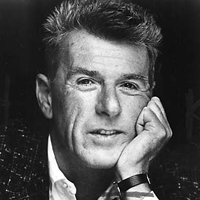Thom Gunn - Biography and Works
Thom Gunn is an English poet who belongs to the mid twentieth-century school of poets called The Movements Poets. Gunn was born in Kent, England, but moved frequently as a child in the wake of his father, a journalist.

Thom Gunn (1929-2004)
After school, Gunn served in the army for two years, and then went to Paris where he worked on the Metro by day and attempted to write a novel by night. He then went up to Trinity College, Cambridge where he attended lectures by the critic F.R. Leavis. He did graduate work at Stanford University under the Formalist poet Yver Winters. Except for a year in San Antonio, Texas, Gunn has lived in San Francisco since 1958.
He has taught Berkeley, but has devoted more time to writing. His early work was influenced by Shakespeare, Donne and the existentialist philosopher Jean-Paul Sartre. He typically married abstract ideas with concrete images, seeking to make the metaphysical or embryonic vivid and comprehensible and fused traditional meter, contemporary subject matter and colloquial idiom. In the 1950s, Gunn moved from statement to exploration, often of personal theme such as his emerging homosexuality and, more recently, the toll exacted by the HIV.
This last is the subject and theme of the poem selected in the course. In his corpus, the subjects range from metaphysical conceits to motorcycle gangs and LSD, and at the center of his work there is a tension between constraint and energy that Gunn describes as a debate between the passion for definition and the passion for flow. Born in England, Gunn moved to California in 1954 for a creative writing fellowship at Stanford University Gunn studied under well known literary critic Yvor Winters, who once remarked that many of Gunn’s early poems exist “on the narrow line between great writing and skillful journalism.” After the death of Dylan Thomas’s in 1953, a new generation of British poets emerged, some influenced by him and some reacting against his influence. Among the leading poets of that generation where Philip Larkin, Thom Gunn and Ted Hughes. Although they had different styles, these pets constituted what became known as “The Movement” and sought to appeal to the common reader with a non-sentimental poetry of the everyday, written in colloquial language. Gunn’s fusion of “modern” and “traditional” elements and his combination of a respect for traditional poetic forms with an interest in sensational topics has prompted critics.
Cite this Page!
Sharma, Kedar N. "Thom Gunn - Biography and Works" BachelorandMaster, 19 Nov. 2013, bachelorandmaster.com/biography/thom-gunn.html.
